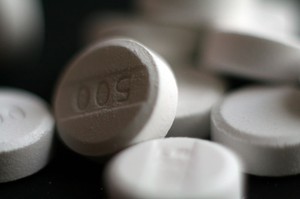Maybe time for harder rules for legal pain killers
Category: Cycling & Doping, Sport
Pain killers can be fantastic. I used to have dysmenorrhea, the worst kind of menstrual pain you can imagine. There was no chance that I could live normally with that pain. During the worst days, I threw up all day and all night and of course, I had to stay home from school for two days every month because of this. It took seven years before I found the solution to my problem. During these years I overdosed painkillers. I nibbled one package of it every month. At least. Sometimes even two. It's true, I needed it to survive, but it was hardly healthy. And the fact is that they did not help much, which made me take some more.
In many elite sports, such as alpine skiing and gymnastics, analgesics are constantly used. Somehow the pain must be hidden away for the results to come. It's not easy to make difficult jumps with an injured foot, believe me. Even though normal painkillers are legal, that constant eating of them can lead to a pill addiction and it can also lead to other kinds of tablets and drugs, leading to doping.
Hopefully, today's younger riders enters the sport with a view that doping is not to be used under any circumstances and choose to remain outside the nasty world that some still engage in. It would've been good to clear away the riff-raffs but also to improve the doping controls.
In pro cycling, painkillers are, of course, used sometimes, because it is a painful sport and it hurts. Unfortunately, the problem is that some riders use it more than others. Taylor Phinney has been in the pro peloton for two years now and says that he thinks the use of painkillers can be dangerous and that it could contribute to crashes.

“Some people find it surprising that riders would take pain killers or caffeine pills in races, but it is actually really, really common,” Phinney told Velonation. “In my first year I tried pain killers a couple of times in races, stuff like Tylenol, but I didn't really get it. Yet there are a lot of guys who do it regularly.
“I’ve always been someone who likes to rely on my own body to solve any sort of sickness, a cold or fever, as opposed to just jumping into taking Tylenol or whatever. So I wasn’t really comfortable with the whole painkiller/caffeine type of thing. In addition to that, it just felt uncomfortable that I would be fooling my body into feeling something that it wasn’t supposed to be feeling.
“Particularly with everything that has gone on in the past, I think that if we move away from taking anything, we have a great opportunity to become pretty much the cleanest professional sport out there.
“I feel comfortable talking about this right now, in light of recent events.”
Painkillers makes you tired, unless they contain caffeine (which I've never tried, but because I get sleepy of caffeine I don't think it would work for me). The head starts to doze, and oh, how easy it is to miss a bump on the road when you are tired.
“You see so many late-race stupid crashes that I almost wouldn’t be surprised if some or most of those crashes are caused by people taking these hard-hitting painkillers at the end of races,” he said.
“There is widespread use of finish bottles, which are just bottles of crushed up caffeine pills and painkillers. That stuff can make you pretty loopy, and that is why I have never tried it. I don’t even want to try it as I feel it dangerous.
“Another issue is taking something for an improvement, getting into that mentality. You have to ask why are you taking a painkiller? You are doing that to mask effects that riding a bike is going to have on your body…essentially, you are taking a painkiller to enhance your performance.
“But the whole reason we get into sport in the first place is to test our bodies, to test our limits. If you are taking something that is going to boost your performance, that is not exactly being true to yourself, not exactly being true to your sport.”
In many elite sports, such as alpine skiing and gymnastics, analgesics are constantly used. Somehow the pain must be hidden away for the results to come. It's not easy to make difficult jumps with an injured foot, believe me. Even though normal painkillers are legal, that constant eating of them can lead to a pill addiction and it can also lead to other kinds of tablets and drugs, leading to doping.
Hopefully, today's younger riders enters the sport with a view that doping is not to be used under any circumstances and choose to remain outside the nasty world that some still engage in. It would've been good to clear away the riff-raffs but also to improve the doping controls.
In pro cycling, painkillers are, of course, used sometimes, because it is a painful sport and it hurts. Unfortunately, the problem is that some riders use it more than others. Taylor Phinney has been in the pro peloton for two years now and says that he thinks the use of painkillers can be dangerous and that it could contribute to crashes.

“Some people find it surprising that riders would take pain killers or caffeine pills in races, but it is actually really, really common,” Phinney told Velonation. “In my first year I tried pain killers a couple of times in races, stuff like Tylenol, but I didn't really get it. Yet there are a lot of guys who do it regularly.
“I’ve always been someone who likes to rely on my own body to solve any sort of sickness, a cold or fever, as opposed to just jumping into taking Tylenol or whatever. So I wasn’t really comfortable with the whole painkiller/caffeine type of thing. In addition to that, it just felt uncomfortable that I would be fooling my body into feeling something that it wasn’t supposed to be feeling.
“Particularly with everything that has gone on in the past, I think that if we move away from taking anything, we have a great opportunity to become pretty much the cleanest professional sport out there.
“I feel comfortable talking about this right now, in light of recent events.”
Painkillers makes you tired, unless they contain caffeine (which I've never tried, but because I get sleepy of caffeine I don't think it would work for me). The head starts to doze, and oh, how easy it is to miss a bump on the road when you are tired.
“You see so many late-race stupid crashes that I almost wouldn’t be surprised if some or most of those crashes are caused by people taking these hard-hitting painkillers at the end of races,” he said.
“There is widespread use of finish bottles, which are just bottles of crushed up caffeine pills and painkillers. That stuff can make you pretty loopy, and that is why I have never tried it. I don’t even want to try it as I feel it dangerous.
“Another issue is taking something for an improvement, getting into that mentality. You have to ask why are you taking a painkiller? You are doing that to mask effects that riding a bike is going to have on your body…essentially, you are taking a painkiller to enhance your performance.
“But the whole reason we get into sport in the first place is to test our bodies, to test our limits. If you are taking something that is going to boost your performance, that is not exactly being true to yourself, not exactly being true to your sport.”

I'm against doping, but I am also aware that I could easily be persuaded to take EPO, for example. Perhaps because I never was injured by my crunching of paracetamol/acetaminophen pills and the fact that I'm still not immune to antibiotics, despite all my ear infections as a child. In my world medicine helps. They help me to reduce the fever, they've got me ready for school/work several times, they've made it possible to continue living despite stomach pains. I would have no problem to use doping, I know that, and I imagne that's the danger of painkillers; it is a relatively innocuous beginning to a dangerous addiction. The athletes who eat painkillers often, ought to see a doctor, a psychologist, anything that can get them to reduce the amount of pills.
“I do think in a way that painkillers could either be a stepping stone to something bigger, or perhaps a step down for maybe an older pro who has had a sketchy past, who has got used to racing with something and has to have something,” Phinney said.
“From there, there is a whole argument about things like cortisone; people can invent a knee injury and get a TUE for that substance. Using that would definitely enhance your performance.
“If it was up to me, I would say if you need cortisone, you shouldn’t be racing. You should get that injury fixed and then you can come back, but you are not racing any more in the meantime.
“It is the same thing with painkillers or something like Sudafed. If you wake up with a fever and you need to take some sort of painkillers to be racing, then you probably shouldn’t be racing in the first place and your team doctor should be worried about your health and send you home.”

